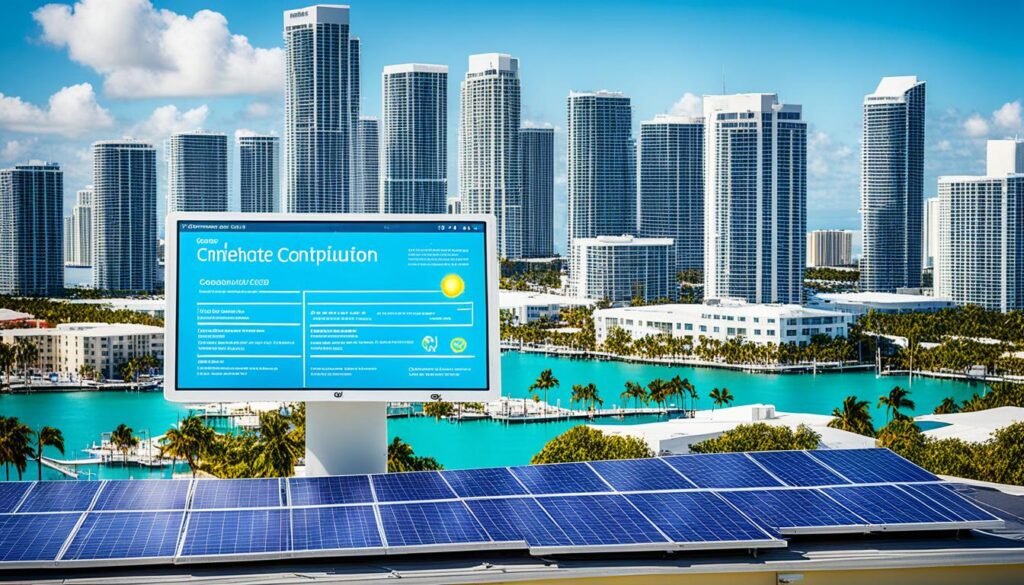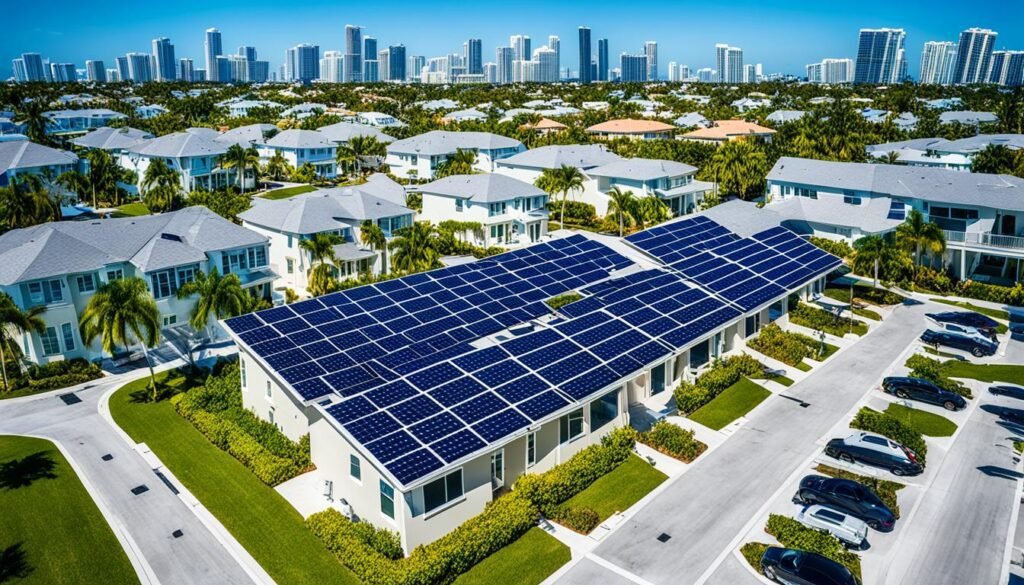Have you ever wondered what it takes to install solar panels in Miami? You’re not alone. This city’s sunshine is perfect for solar energy. Yet, you must know that permits are required. The process differs for homes and businesses. If you want to lower energy costs or help the planet, knowing the miami construction code solar panels is key for easy installation.
Key Takeaways
- Residential projects in Miami do not require a separate roofing permit for solar panel installations.
- Commercial projects need both roofing and solar panel permits.
- Proper verification that your property is within Miami city limits is necessary.
- Contractors should hold EC or CVC certifications.
- Permit applications must be signed and notarized, with comprehensive plans and diagrams included.
- Compliance with NEC 705.12D (120%) and use of UL-listed components and PV cables are mandatory.
- Applications are managed through the iBuild online system, requiring digital signatures and precise document uploads.
Why Choose Solar Panels in Miami?
Miami’s sunny weather is perfect for solar energy, making it a great choice for many. The consistent sunshine helps generate energy efficiently. This leads to big savings over time.
Benefits of Miami’s Climate for Solar Energy
Miami’s endless sunshine means reliable energy. This results in lower bills and more energy independence. Getting solar energy permits in Miami Dade County is easy due to good support and laws.
This helps us use less non-renewable energy. It also supports a sustainable and green lifestyle.
Environmental and Financial Advantages
Using solar energy fits Miami’s solid building standards. It saves us money in the long run. Solar panel buyers save on bills and get tax breaks too.
Following local construction guidelines helps the environment. Solar energy safeguards our natural surroundings and improves local air quality. It’s beneficial for everyone.
Investing in solar panels supports Miami’s green goals. It lets us all help make a sustainable future. Plus, there are financial perks to making this smart decision.
Understanding Miami Construction Code for Solar Panels
The 2023 Florida Building Code is now in action. It’s important for us to know its impact on setting up solar energy systems. The main changes are about safety, better performance, and keeping solar systems safe and sound in Miami.
Overview of the 2023 Florida Building Code
The new rules set clear steps for putting in solar panels. One key rule is that solar panels and modules must meet UL 1703 standards. This rule ensures the solar panels we use are safe and of good quality. Also, inverters must follow UL 1741 standards. This is crucial for making sure the power they give our homes is reliable and safe.
Key Sections Relevant to Solar Panel Installation
The new code pays a lot of attention to how solar panels are put up. It points to UL 2703 for how to mount systems correctly. Following this makes sure panels are attached to roofs securely. This helps avoid any risks that come with bad installation jobs.
It also talks about Building-integrated Photovoltaic (BIPV) systems. These are part of the building itself, like the roof. There are special rules for these systems, especially about being safe from fire and strong wind. Following ASCE 7 standards for wind is crucial. This helps the systems withstand Miami’s weather, including hurricanes.
“Installers must ensure that both photovoltaic panels and mounting systems meet the necessary standards to comply with the Miami construction code solar panels guidelines,” emphasizes a notable expert in the field.
In short, following Miami’s building codes for solar panels makes sure they work well and are safe. They can stand up to the local weather too.
By staying current with florida solar panel regulations, our solar projects will be safe and effective. This is good for both the environment and our energy use.
Necessary Permits for Installing Solar Panels in Miami
Getting the right permits for solar panel installation in Miami is key. Residential and commercial projects have different requirements. This makes sure every installation meets Miami’s rules for solar panels.
Residential vs. Commercial Permits
Homeowners find it easier to get solar permits in Miami-Dade County. They usually don’t need a separate permit for roofing. But, for commercial projects, the rules are stricter. These projects need permits for both roofing and solar panels. Knowing these differences helps follow Miami’s solar panel code.
Steps to Obtain a Solar Panel Permit
To get a solar panel permit in Miami, you start with a notarized application and detailed plans. You need to show that your plans meet all regulations. This includes material data sheets and other proofs.
Then, use the iBuild portal to submit your application online. Create an account, upload the needed documents, and follow the guidelines carefully. City officials will check your submissions. They might ask for changes and more information before saying yes.
Following these steps carefully helps get your permit faster. With all the right documents, you’re on your way to installing solar panels in Miami’s sunny weather.
Document Checklist for Solar Panel Installation
It’s key to have all needed papers ready for solar panel setup. This makes sure we meet the florida solar panel regulations. Following a detailed checklist is key for matching the miami construction code solar panels.
Required Plans and Specifications
Here’s what we need to gather:
- A permit signed by the owner and the contractor.
- Plans approved by a Florida engineer or a qualified contractor. These must follow the miami solar panel installation guidelines.
- Exact details on equipment, wiring, and how it connects to the grid.
- Info sheets from the makers, listing all installation parts.
All these documents must meet the miami construction code solar panels to prevent any delays.
Notarization and Digital Signatures
Signatures on the permit need notarization. This proves who is involved, adding a necessary layer of legal safety, vital under florida solar panel regulations.
For online submissions, digital signatures are a must. They confirm the documents’ authenticity. It’s key to use approved services for this, following Miami’s ePlan guide for easy filing.
By carefully doing these steps, we make sure our project follows all miami solar panel installation guidelines, miami construction code solar panels, and florida solar panel regulations. This leads to a trouble-free install.
Working with Licensed Contractors
Working with a licensed contractor is key for solar panel installations in Miami. It’s important they have an EC (Electrical Contractor) or CVC (Certified Ventilation Contractor) license. This makes sure they follow the miami construction code solar panels.
Importance of EC or CVC Licenses
Hiring contractors with EC or CVC licenses means they know their stuff about solar installations. These licenses show they’ve had tough training and know how to stick to florida solar panel regulations and miami building regulations solar energy. This is good not just for following rules but also for the safety and effectiveness of your solar setup.
Finding Qualified Contractors
Finding the right contractors can be done in a few ways:
- Look through industry directories.
- Ask for recommendations from people you trust.
- Reach out to professional trade groups.
It’s important to check a contractor’s qualifications. Make sure they’ve worked with solar energy systems to stay in line with miami construction code solar panels. Being careful here ensures your installation is up to code, safe, and works well.
Submitting Your Application Online
Applying for a solar panel permit in Miami has become easier with the iBuild online system. This tool helps organize and process your paperwork swiftly. It makes the approval process smoother.
Creating and Managing Your iBuild Account
First, you’ll need to create an account on iBuild. This will be your main area for submitting projects. After signing up and following the steps, you can oversee your application status easily.
Uploading Required Documents
Next step is uploading the needed documents. Be sure to follow the Standard Naming Convention for files. Every submission must be digital and signed to adhere to the miami construction code solar panels. This forms a big part of your submission.

You will also need to upload planning documents and installation details meeting the miami solar panel installation guidelines. Ensuring your documents are complete and properly uploaded will help avoid delays.
Make sure to correctly categorize your documents within the system. This helps meet the building codes for solar panels in miami. Paying attention to these details can significantly speed up your application’s review process.
Understanding Miami-Dade County’s Sustainable Building Program
Miami-Dade County supports green building, speeding up reviews for solar or wind power projects. This matches Miami’s construction rules and solar energy needs.
Following these rules can get you lower permit fees and faster approvals. Let’s explore this program’s benefits.
Green Building Expedited Review Process
The Green Building Expedited Review Process speeds up solar panel reviews. By using the Portal to submit plans, reviews across departments happen faster. This ensures quicker responses.
Submitting the SBP New Project Form
To join the Sustainable Building Program (SBP), you must submit the SBP New Project Form. This form checks if you meet Miami’s green construction standards. It also checks for correct solar installation details, helping quicken reviews and boost renewable energy use.
Here’s a table comparing the normal and fast review processes in Miami-Dade County:
| Review Process | Documentation | Timeframe | Fee Benefit |
|---|---|---|---|
| Standard Review | Physical Plans & Forms | 6-8 Weeks | None |
| Expedited Review | Electronic Submissions via Portal | 2-4 Weeks | Reduced Permit Fees |
By sticking to Miami’s green building guidelines and joining the SBP, we encourage using renewable energy. This helps us achieve our big goal of environmental sustainability. It also ensures we follow Miami’s solar energy rules.
Miami’s Rooftop Solar Energy Systems Regulations
Rooftop solar systems in Miami must follow strict rules. These rules help make sure the systems work well and can handle the weather. Building codes cover several key areas to keep things safe and effective.
Flashing and Weather Protection Requirements
Keeping water out is key in Miami’s solar panel codes. Flashings protect the roof from water. They must be placed exactly right to stop water from getting in.
Wind and Fire Resistance Standards
Miami’s building codes focus on keeping solar panels safe from wind and fire. The panels must be strong enough to handle hurricane winds. Fire safety is also a must. The solar panels’ fire rating needs to match the roof’s rating. This keeps the solar setup safe in bad weather.
| Requirement | Description |
|---|---|
| Flashing Requirements | Seals roofing against moisture; specific placements mandated by code |
| Wind Resistance | Designed to meet ASCE 7 wind load standards |
| Fire Resistance | Fire classification must match the overall roof assembly |
Following these rules means our solar systems will work well. They’ll also last through Miami’s tough weather. This makes our investment in solar power both smart and secure.
Miami Construction Code Solar Panels Guidelines
Adhering to the Miami construction code for solar panels is crucial. It ensures safe and efficient renewable energy setups. Following these guidelines helps projects meet local standards and supports sustainable growth.

Ensuring Compliance with UL Standards
Meeting UL standards is key for solar installations. This includes UL 1703 for panels and modules, plus UL 1741 for inverters, and UL 2703 for mounting systems. Miami’s guidelines emphasize these standards for safety and reliability. Contractors must check the UL listing of all materials to comply with Florida’s solar regulations.
Installation Instructions for BIPV Systems
BIPV systems blend in by serving as both roof material and solar solution. They must be installed as per Miami’s detailed guidelines. This ensures compliance with wind resistance and fire safety standards, crucial for Miami’s weather challenges. Proper installation boosts energy efficiency and safety.
Scheduling and Passing Inspections
After solar panels are installed, it’s crucial to arrange an inspection. This step confirms the setup follows local building and safety rules.
Inspections check if the solar system fits the approved plans and all parts are properly in place. It’s vital for the system’s reliability and for getting solar energy permits in Miami-Dade County.
Preparing for Electrical Inspections
Getting ready for electrical inspections helps make them go smoother. It means making sure all parts, like wires, inverters, and mounts, are up to code. If everything, including where the panels are and how they’re wired, matches the rules, you avoid delays.
Common Mistakes to Avoid
Some errors can slow down or complicate the inspection. Not labeling equipment right can confuse inspectors. Or, straying from the agreed plans might need extra fixes.
- Ensure all documentation follows the required file naming conventions.
- Verify that each piece of equipment is accurately labeled and positioned as per the plan.
- Adhere to the stipulated page count for each submitted file to avoid resubmissions.
To have a smooth inspection, steer clear of these mistakes. This ensures you meet Miami’s rules for solar installations.
Fee Structure and Payment Process
It’s vital to understand the fee structure when you’re applying for solar panel installation permits in Miami. This includes permit costs and possible extra charges, like fees for re-checking documents that need corrections. The Building Department offers all the cost details you need.
After your application gets the green light, you will get an invoice with the total fees. This helps you know exactly how much to pay.
Payments can be made online or at the cashier’s office in person. After paying, you must always have your permit card at the work site. Also, remember to schedule an electrical inspection when the installation is done. You can do this online or through the Building Department.
Understanding Permit and Ancillary Fees
For miami construction permits involving renewable energy, knowing the fees is key. The Building Department will tell you about the permit fees and additional costs. These could include charges for reviewing documents again. Knowing these fees helps avoid surprises and keeps the permitting process smooth.
Online Payment Options
Paying your fees is easy with online options. You can use specific portals that are quick and secure. This makes managing payments for your miami construction code solar panels a breeze. By following these guidelines, the process will be smoother and well-documented.
Here is a breakdown of the fee structure:
| Fee Type | Description |
|---|---|
| Permit Fee | Cost for issuing the permit |
| Ancillary Fees | Additional fees for services such as re-reviews |
| Inspection Fees | Charges for scheduling required inspections |
Conclusion
In wrapping up this guide on Miami construction code solar panels, it’s clear that knowing and following the rules is key. Miami’s sunny weather and good climate are perfect for solar energy. This matches well with both helping the environment and saving money.
Getting permits might look complex at first. But if you follow the guidelines and work with licensed contractors, it goes smoothly. Following Miami building regulations solar energy ensures your solar panels are safe and effective. Plus, it boosts your energy freedom and helps the environment.
Understanding local codes, permits, and inspections helps us move towards a more sustainable future. Using solar energy, as per Florida solar panel regulations, benefits not just us but also the planet. Let’s use Miami’s unique assets to make wise energy choices. These choices help our environment and our wallets.



